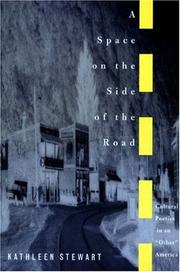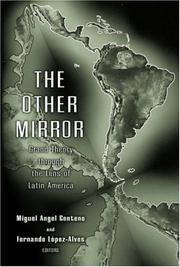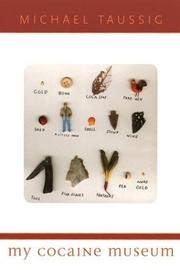| Listing 1 - 8 of 8 |
Sort by
|
Book
ISBN: 9783775728508 Year: 2011 Publisher: Ostfilern : Hatje Cantz,
Abstract | Keywords | Export | Availability | Bookmark
 Loading...
Loading...Choose an application
- Reference Manager
- EndNote
- RefWorks (Direct export to RefWorks)
Book
ISBN: 9782930667201 2930667206 Year: 2019 Publisher: Brussel : (SIC.),
Abstract | Keywords | Export | Availability | Bookmark
 Loading...
Loading...Choose an application
- Reference Manager
- EndNote
- RefWorks (Direct export to RefWorks)
Michael Taussig, figure majeure quoique controversée de l'anthropologie anglo-saxonne, s'attache à mettre en évidence la fonction heuristique des croquis et dessins réalisés par l'ethnographe dans ses carnets de notes. Si ce texte personnel apporte une contribution précieuse à la réflexion sur l'enquête de terrain et la manière dont les savoirs s'y agencent, sa portée dépasse largement le cadre de l'ethnographie. Taussig y déploie en effet une réflexion pénétrante sur le pouvoir des images à ressaisir la réalité et à capter ce qui semble résister à la verbalisation. En retour, l'écriture si singulière de l'auteur porte, par les nombreuses références littéraires qui la parsèment et son style même, une interrogation tout aussi profonde sur le rapport du langage à la vérité et sur la dimension fictionnelle inhérente à tout discours, fût-il scientifique.
Taussig, Michael --- Anthropology --- Anthropological illustration --- Fieldwork --- Methodology --- Anthropology - Fieldwork --- Anthropology - Methodology --- Anthropologie --- Ethnologie --- Carnet de voyage
Book
ISBN: 9780226515946 022651594X 9780226516134 022651613X Year: 2018 Publisher: Chicago London The University of Chicago Press
Abstract | Keywords | Export | Availability | Bookmark
 Loading...
Loading...Choose an application
- Reference Manager
- EndNote
- RefWorks (Direct export to RefWorks)
"Palma africana represents the latest attempt by anthropologist Michael Taussig to make sense of the threat to life, human and nonhuman, that characterizes the contemporary moment. In Colombia, where Taussig has worked for decades, palm oil plantations are spreading in areas that were once cornucopias of animal, bird, and plant life. Deforestation and habitat loss are the first effects."--Provided by publisher.
Oil palm --- Palm oil industry --- Ethnology --- Plantations --- Social aspects --- Economic aspects --- Environmental aspects --- Taussig, Michael T. --- Colombia --- Social conditions. --- Environmental conditions.
Book
ISBN: 022651627X Year: 2018 Publisher: Chicago ; London : The University of Chicago Press,
Abstract | Keywords | Export | Availability | Bookmark
 Loading...
Loading...Choose an application
- Reference Manager
- EndNote
- RefWorks (Direct export to RefWorks)
“It is the contemporary elixir from which all manner of being emerges, the metamorphic sublime, an alchemist’s dream.” So begins Palma Africana, the latest attempt by anthropologist Michael Taussig to make sense of the contemporary moment. But to what elixir does he refer? Palm oil. Saturating everything from potato chips to nail polish, palm oil has made its way into half of the packaged goods in our supermarkets. By 2020, world production will be double what it was in 2000. In Colombia, palm oil plantations are covering over one-time cornucopias of animal, bird, and plant life. Over time, they threaten indigenous livelihoods and give rise to abusive labor conditions and major human rights violations. The list of entwined horrors—climatic, biological, social—is long. But Taussig takes no comfort in our usual labels: “habitat loss,” “human rights abuses,” “climate change.” The shock of these words has passed; nowadays it is all a blur. Hence, Taussig’s keen attention to words and writing throughout this work. He takes cues from precursors’ ruminations: Roland Barthes’s suggestion that trees form an alphabet in which the palm tree is the loveliest; William Burroughs’s retort to critics that for him words are alive like animals and don’t like to be kept in pages—cut them and the words are let free. Steeped in a lifetime of philosophical and ethnographic exploration, Palma Africana undercuts the banality of the destruction taking place all around us and offers a penetrating vision of the global condition. Richly illustrated and written with experimental verve, this book is Taussig’s Tristes Tropiques for the twenty-first century.
Plantations --- Ethnology --- Palm oil industry --- Oil palm --- Environmental aspects --- Social aspects --- Economic aspects --- Taussig, Michael T. --- Colombia --- Environmental conditions. --- Social conditions. --- Colombia. --- Taussig. --- anthropology. --- deforestation. --- ethnography. --- habitat. --- palm oil. --- plantations.
Book
ISSN: 26459906 ISBN: 9782490077595 2490077597 Year: 2021 Volume: 9 Publisher: Paris: B42,
Abstract | Keywords | Export | Availability | Bookmark
 Loading...
Loading...Choose an application
- Reference Manager
- EndNote
- RefWorks (Direct export to RefWorks)
Dans Palma Africana, l’anthropologue australien Michael Taussig poursuit son étude de la matière et explore la production d’huile de palme en Colombie. Alors que cette dernière envahit tout, des chips au vernis à ongles, et a fait son chemin pour envahir les biens de consommation courante présents sur les étals de nos supermarchés, l’auteur examine les conséquences écologiques, politiques et sociales de cette exploitation. La production mondiale d’huile de palme a presque doublé en vingt ans et les plantations de palmiers à huile remplacent peu à peu ce qui fut une oasis de vie pour les animaux, les oiseaux et les plantes. Dans un contexte encore marqué par le conflit entre la guérilla des FARC et les paramilitaires colombiens, l’agrobusiness en est venu à menacer l’habitat indigène, tout en donnant lieu à des conditions de travail abusives et à des violations majeures des droits de l’homme. Bien que la liste de l’intrication des horreurs induites par cette exploitation soit longue, nos terminologies habituelles (« disparition de l’habitat naturel », « violation des droits de l’homme », « changement climatique »...) semblent dépassées. Sous la forme d’une déambulation anthropo-poétique au cœur des marécages colombiens, ce sont aussi les mots et l’écriture qu’interrogent l’auteur. Dans un récit riche en références littéraires, Michael Taussig prend date des ruminations de ses prédécesseurs, comme Roland Barthes, pour qui les arbres forment un alphabet où le palmier est le plus charmant. William Burroughs arguait, face à ses détracteurs, que les mots étaient aussi vivants que des animaux et n’aimaient pas être maintenus en pages – coupez ces dernières et ils seront rendus à leur liberté. Pensé à partir d’une vie d’exploration philosophique et ethnographique en Colombie, Palma Africana cherche à contrecarrer la banalité de la destruction du monde et offre une vision pénétrante de notre condition humaine. Illustré de photographies prises sur le terrain par l’auteur et écrit avec la verve expérimentale propre à l’anthropologue, ce livre est le Triste Tropique de Michael Taussig pour le XXIe siècle.
Oil palm --- Palm oil industry --- Ethnology --- Plantations --- Social aspects --- Economic aspects --- Environmental aspects --- Taussig, Michael T. --- Colombia --- Social conditions --- Environmental conditions --- Huile de palme --- Aspect social --- Aspect économique --- Oil palm - Social aspects - Colombia --- Oil palm - Economic aspects - Colombia --- Palm oil industry - Environmental aspects - Colombia --- Ethnology - Colombia --- Plantations - Colombia --- Colombia - Social conditions --- Colombia - Environmental conditions --- Palm oil. --- History.

ISBN: 0691011036 0691011044 9780691011035 9780691011042 0691212880 Year: 1996 Publisher: Princeton Princeton University Press
Abstract | Keywords | Export | Availability | Bookmark
 Loading...
Loading...Choose an application
- Reference Manager
- EndNote
- RefWorks (Direct export to RefWorks)
"A Space on the Side of the Road vividly evokes an 'other' America that survives precariously among the ruins of the West Virginia coal camps and 'hollers'....[It] uses both language and photographs to help readers encounter a fragmented and betrayed community, one 'occupied' by schoolteachers, doctors, social workers, and other professionals representing an 'official' America." -- Back cover.
Coal miners --- Ethnology --- Folklore --- West Virginia --- Rural conditions. --- Social life and customs. --- Rural conditions --- Social life and customs --- Kolgruvearbetare. --- Förenta staterna --- West Virginia. --- Agee, James. --- Barthes, Roland. --- Halloween. --- Jakobson, Roman. --- Kennedy, John R. --- Langer, Susanne. --- Luddites. --- Propp, Vladimir. --- Ricoeur, Paul. --- Rosaldo, Renato. --- Said, Edward. --- Stocking, George. --- Taussig, Michael. --- White, Hayden. --- Williams, Raymond. --- back talk. --- ethnopoetics. --- exotopy. --- fate. --- ideals. --- mythic, the. --- naming. --- nervous system. --- quilting. --- ruin. --- signs. --- sociality. --- storytelling. --- unforgetting. --- world got down.

ISBN: 0691050163 0691050171 Year: 2001 Publisher: Oxford : Princeton University Press,
Abstract | Keywords | Export | Availability | Bookmark
 Loading...
Loading...Choose an application
- Reference Manager
- EndNote
- RefWorks (Direct export to RefWorks)
If social science's "cultural turn" has taught us anything, it is that knowledge is constrained by the time and place in which it is produced. In response, scholars have begun to reassess social theory from the standpoints of groups and places outside of the European context upon which most grand theory is based. Here a distinguished group of scholars reevaluates widely accepted theories of state, property, race, and economics against Latin American experiences with a two-fold purpose. They seek to deepen our understanding of Latin America and the problems it faces. And, by testing social science paradigms against a broader variety of cases, they pursue a better and truly generalizable map of the social world. Bringing universal theory into dialogue with specific history, the contributors consider what forms Latin American variations of classical themes might take and which theories are most useful in describing Latin America. For example, the Argentinian experience reveals the limitations of neoclassical descriptions of economic development, but Charles Tilly's emphasis on the importance of war and collective action to statemaking holds up well when thoughtfully adapted to Latin American situations. Marxist structural analysis is problematic in a region where political divisions do not fully expresses class cleavages, but aspects of Karl Polanyi's socioeconomic theory cross borders with relative ease. This fresh theoretical discussion expands the scope of Latin American studies and social theory, bringing the two into an unprecedented conversation that will benefit both. Contributors are, in addition to the editors, Jeremy Adelman, Jorge I. Domínguez, Paul Gootenberg, Alan Knight, Robert M. Levine, Claudio Lomnitz, John Markoff, Verónica Montecinos, Steven C. Topik, and J. Samuel Valenzuela.
Social sciences --- Sciences sociales --- Philosophy. --- Philosophie --- Latin America --- Amérique latine --- Politics and government. --- Economic conditions. --- Politique et gouvernement --- Conditions économiques --- #SBIB:39A74 --- Behavioral sciences --- Human sciences --- Sciences, Social --- Social science --- Social studies --- Civilization --- Social philosophy --- Social theory --- Philosophy --- Etnografie: Amerika --- SCIENZE SOCIALI --- Teorie --- America Latina. --- Allende, Salvador. --- Avellaneda, Nicolás. --- Bauer, Arnold. --- Betancourt, Rómulo. --- Bolivia revolution. --- Brazil Empire. --- Castro, Fidel. --- Centeno, Miguel. --- Chiapas peasant revolt (Mexico). --- Chilean Constitution of 1833. --- Crosby, Alfred. --- Economist. --- Eden imagery. --- Freud, Sigmund. --- Grindle, Merilee. --- Hamilton, Richard. --- Jenkins, Henry. --- Juárez, Benito. --- Keynesian school. --- Korea. --- Landless Movement. --- Leninist party (Cuba). --- Malinowski, Bronislaw. --- Marichal, Carlos. --- Meyer, John. --- New Jerusalem massacre. --- Nicaragua. --- North, Douglass. --- Oribe, Manuel. --- Osterreichische Volkswirt journal. --- Owens, Robert. --- Papia, Primo. --- Pietschmann, Horst. --- Poland. --- Romania. --- Russian Revolution (1917). --- Saravia, Aparicio. --- Singer, Hans. --- Stalinism state. --- Taussig, Michael. --- Thatcher, Margaret. --- Tinsman, Heidi. --- agent state type. --- dependentistas. --- doux commerce image. --- fascism state. --- homesteading practice. --- institutional rules. --- moral economy. --- nacional. --- national identity. --- protectionism. --- reciprocity.

ISBN: 0226790096 0226790088 9786612646485 1282646486 0226790150 9780226790152 9780226790084 9780226790091 Year: 2004 Publisher: Chicago University of Chicago Press
Abstract | Keywords | Export | Availability | Bookmark
 Loading...
Loading...Choose an application
- Reference Manager
- EndNote
- RefWorks (Direct export to RefWorks)
In this book, a make-believe cocaine museum becomes a vantage point from which to assess the lives of Afro-Colombian gold miners drawn into the dangerous world of cocaine production in the rain forest of Colombia's Pacific Coast. Although modeled on the famous Gold Museum in Colombia's central bank, the Banco de la República, Taussig's museum is also a parody aimed at the museum's failure to acknowledge the African slaves who mined the country's wealth for almost four hundred years. Combining natural history with political history in a filmic, montage style, Taussig deploys the show-and-tell modality of a museum to engage with the inner life of heat, rain, stone, and swamp, no less than with the life of gold and cocaine. This effort to find a poetry of words becoming things is brought to a head by the explosive qualities of those sublime fetishes of evil beauty, gold and cocaine. At its core, Taussig's museum is about the lure of forbidden things, charged substances that transgress moral codes, the distinctions we use to make sense of the world, and above all the conventional way we write stories.
gold mines --- economics --- drugs --- Economics --- Colombia --- Cocaine industry --- Drug traffic --- Gold mines and mining --- Indians of South America --- Indians, Treatment of --- Slavery --- Economic conditions. --- Social conditions. --- History. --- Santa María (Cauca, Colombia) --- Drug dealing --- Drug production, Illicit --- Drug smuggling --- Drug trade, Illicit --- Drug trafficking --- Drugs --- Illicit drug production --- Illicit drug trade --- Narcotic trade --- Narcotic traffic --- Narcotic trafficking --- Smuggling of drugs --- Smuggling of narcotics --- Traffic, Drug --- Trafficking in drugs --- Trafficking in narcotics --- Gold discoveries --- Gold extraction (Mining) --- Gold fields --- Gold mining --- Gold rush --- Gold rushes --- Goldfields --- Goldmining --- Goldrush --- Goldrushes --- Sites, Gold mining --- Abolition of slavery --- Antislavery --- Enslavement --- Mui tsai --- Ownership of slaves --- Servitude --- Slave keeping --- Slave system --- Slaveholding --- Thralldom --- American aborigines --- American Indians --- Indigenous peoples --- Prices and sale --- Ethnology --- Drug abuse and crime --- Narco-terrorism --- Mines and mineral resources --- Crimes against humanity --- Serfdom --- Slaveholders --- Slaves --- Indians --- Government relations --- Economic conditions --- Social conditions --- History --- Santa María (Cauca, Colombia) --- Taussig, Michael --- Cocaine industry - Colombia - Santa María (Cauca) --- Drug traffic - Colombia - Santa María (Cauca) --- Gold mines and mining - Colombia - Santa María (Cauca) --- Indians of South America - Colombia - Santa María (Cauca) - Economic conditions --- Indians of South America - Colombia - Santa María (Cauca) - Social conditions --- Indians, Treatment of - Colombia - Santa María (Cauca) --- Slavery - Colombia - Santa María (Cauca) - History --- Santa María (Cauca, Colombia) - Economic conditions --- Santa María (Cauca, Colombia) - Social conditions --- gold museum, pacific coast, colombia, miners, cocaine, rain forest, slavery, slaves, labor, colonialism, transgression, forbidden, afro-colombian, banco de la republica, race, racism, exploitation, capitalism, wealth, politics, history, fetish, corruption, indigenous, native, santa maraia, cauca, mines, drug traffic, nonfiction. --- Santa Maria (Cauca, Colombia)
| Listing 1 - 8 of 8 |
Sort by
|

 Search
Search Feedback
Feedback About UniCat
About UniCat  Help
Help News
News